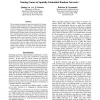879 search results - page 38 / 176 » Modelling Learning in an Educational Game |
CORR
2008
Springer
13 years 9 months ago
2008
Springer
Many models from a variety of areas involve the computation of an equilibrium or fixed point of some kind. Examples include Nash equilibria in games; market equilibria; computing o...
IUI
2003
ACM
14 years 2 months ago
2003
ACM
We present a probabilistic model, based on Dynamic Decision Networks, to assess user affect from possible causes of emotional arousal. The model relies on the OCC cognitive theory...
CORR
2006
Springer
13 years 9 months ago
2006
Springer
We investigate a prototypical agent-based model, the Naming Game, on random geometric networks. The Naming Game is a minimal model, employing local communications that captures th...
AAAI
2011
12 years 8 months ago
2011
A general game player automatically learns to play arbitrary new games solely by being told their rules. For this purpose games are specified in the game description language GDL...
ATAL
2011
Springer
12 years 8 months ago
2011
Springer
We develop an algorithm for opponent modeling in large extensive-form games of imperfect information. It works by observing the opponent’s action frequencies and building an opp...

